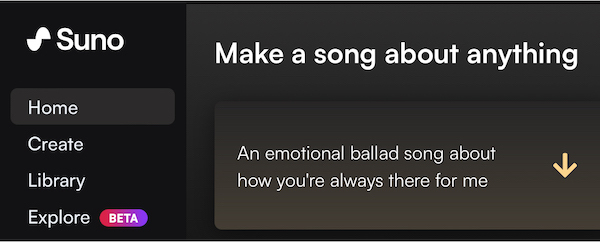Arts Commentary: Record Companies Suing AI — Who Owns Input?
By Steve Provizer
The real action, rest assured, will take place in the counting house, not the courthouse.

Record companies Universal Music Group, Capitol Records, Sony Music Entertainment, Atlantic Records, and Warner Music have filed lawsuits against Suno and Udio (Uncharted Labs), companies selling software that uses AI to generate music. These lawsuits will be successful if they can prove that AI is creating unlicensed “derivative works.” Suno and Udio will prevail if they successfully prove “Fair Use” under copyright law. The real action, rest assured, will take place in the counting house, not the courthouse.
My assumption is that Suno and Udio took a calculated risk and decided not to cut deals that would recompense record companies or performers much beyond the purchase of the material itself. This comment given by Mikey Shulman, CEO of Suno, in a Boston Globe interview, sheds some light: “What I’ll say is we obviously work very closely with lawyers to make sure what we’re doing is legal and also happens to be industry-standard. The exact recipe here has to be a closely guarded secret.” Of course, this is uncharted territory, so I don’t know what they mean by “industry standards.” I assume that means paying retail.
Suno and Udio also note that users of their technology will not be allowed to request music that duplicates the work of a specific musician. However, it is apparent that a vivid enough description (via an exact prompt) will amount to the same thing. You may not be able to say “Make me a Muddy Waters song,” but you can say: “Create music that a black blues musician with a gravelly voice who switched from acoustic to electric slide guitar might have played in the late ’40s when he came from the Mississippi Delta and moved to the South Side of Chicago.”
Another point the AI corporations will press that might resonate — while not directly related to Fair Use — is that professional-sounding AI-generated music will become more widely available. As Shulman says, “The deli on the corner now gets a jingle…”
There are other benefits of AI that might buttress their position. For example, there is ongoing research into links between music therapy and mental health. If this research was undertaken pro bono by large outfits such as Suno and Udio it might not have legal ramifications, but could be exploited as a bargaining tool in the court of public opinion. The fact that AI-generated music can be used in combination with non-AI music constitutes another bargaining chip.
The case that the record companies make is simple: Suno and Udio trained their AI systems using an enormous amount of copyrighted material without obtaining permission.
Recorded music is the principal raw material from which new compositions are created, whether by people or computers. Can a legal difference be parsed between a human and a computer undertaking this process? Answering that question is irrelevant because the record companies are not making an aesthetic case — suggesting that AI puts out an inferior product. The argument is about input, not output.

Beeple, The Battle of AI Art, 2022. Courtesy: The Artist
If a musician obtains music legally, no one could gainsay that person’s right to listen to whatever they want and as much as they want. Courts have been called on to determine whether or not parts of or complete songs have been stolen, but, more appositely, they have had to rule whether jazz improvisations can be copyrighted. The decision was that solos are derivative material and can’t be copyrighted (only copyright holders can sue bootleggers, so jazz musicians can’t be protected from bootleg recordings). The skill it takes to transmute source material into creative product varies from musician to musician; thus it makes sense to not extend legal protection to the solos of everyone from Charlie Parker to musicians whose solos are recycled Parker licks. Similarly, the output, the quality of what is produced by AI is not something a legal system would easily be able to determine.
So, in the end, Fair Use will be a factor. However, simply because of how difficult it is to adjudicate (I write about the difficulties here and here), litigation will be decided on whether or not the sheer quantity of material that is fed into a bank of AI-generating computers necessitates the establishment of a new fee schedule. My gut tells me the whole thing will be settled out of court.
Every negotiation around technology in the past decade has been a body blow to musicians, so it’s hard to conceive that this negotiation, conducted between competing phalanxes of lawyers, would result in a dispersal of funds to composers and musicians; certainly nothing that would come anywhere close to compensation equivalent to losses caused by AI.
We need to talk about putting guardrails around AI. People should be made more aware of its current — and potential — downsides. First, AI is an energy sinkhole. By 2026, AI energy demand will be equal to that of Sweden or Germany. Second, some experts are alarmed about how AI can be misused currently (bomb-making, election-rigging) and warn about its longer-term, even more dangerous possibilities.
Part of me wants to line up behind my own species, hoping this technological juggernaut will be crushed in court. But corporate lawyers and robed arbiters cannot be counted on to set up a last line of defense — more like a Maginot Line. The Screen Actors Guild and the Writer’s Guild had enough clout to be able to negotiate on behalf of their members, staving off some of the more egregious manifestations of AI. But musicians have no such power. The ears of the public will have the last word, and, since I have little faith in popular tastes, I am pessimistic. History may spiral back, as it has with vinyl and DIY. Perhaps “human-made” music will come back into fashion. But, at this point, the profit-making digital horse has left the barn and moved into a computer lab, adjacent to a corporate suite. In the long term, chances are one kind of do-re-mi will simply squeeze out the other.
Steve Provizer writes on a range of subjects, most often the arts. He is a musician and blogs about jazz here.
Tagged: AI, Atlantic Records, Capitol Records, Sony Music Entertainment, Suno, Udio, Universal Music Group

